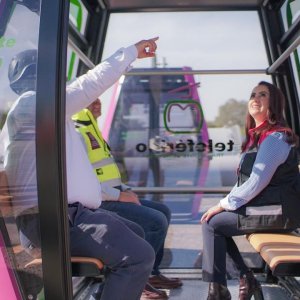Smart, Inclusive City Transport

STORY INLINE POST
Sustainable, smart and inclusive cities connected through technology is Alejandro Morales’ vision for Mexico City. The Co-founder of Econduce says the company’s business model has sharing economy at its center. “We knew we wanted to improve the city, the environment and people’s lives, while also offering a profitable business opportunity,” says Morales.
While Econduce’s scooter model might be innovative enough to catch investors’ eyes, it was the environmental contingency period that began on March 14, 2016, and the subsequent extended No-Drive Day policy enforced by Mexico City’s government that boosted Econduce’s popularity. When this happened in mid-2016, cars were prohibited from being used one day a week depending on each vehicle’s number plate. This measure forced commuters to investigate new modes of transport. “Demand rose from one day to the next. We had a planned and controlled growth rate but the No-Drive Day policy gave us momentum,” says Morales.
Despite being a startup, Econduce handled the extra demand without altering its services or prices. “The availability of our scooters was reduced but all our users understood it was due to the period of restricted private vehicle use,” recalls Morales. He says the rise in the service’s popularity during the No-Drive Day period was no surprise. During the days that the city’s government enforced its car-use policies aimed at reducing pollution in the capital city, the public transport system passenger count on the metro increased between 15 and 18 percent. This accounts for almost 800,000 additional passengers to the usual 5.5 million daily commuters.
According to Morales, the real surprise for Econduce came months after the contingency ended when the company registered even more trips than during the months of the extended No-Drive Day policy. The company’s growth and acceptance has been of such magnitude that Econduce is now facing a problem that every company would love to face. “We have reached a point where we would like to maintain the number of users for a period of time because an increase in users may limit their access to the service.”
While the service’s popularity reflects positively on the quality and functionality of Econduce’s vehicles, it also reflects the success of a business model that does not rely on standard marketing strategies. “We operate a business based on a networking model,” says Morales. “If we have more scooter stations and more scooters available, users will feel that it is a convenient transportation method for them and we will grow more.” Expanding this is the company’s short-term plan. Of Econduce’s almost 3,000 active users, 60 percent have become regular clients. With only 5 percent of the company’s users being referrals from existing clients, the remaining 35 percent are the result of the company’s limited marketing campaigns, media appearances and promotional events.
Closing 2016 with almost 250 scooters, Econduce has already reached the maximum number of clients it can accommodate per scooter. “The biggest challenge now is to invest in expanding the scooter fleet, so units are available to users at all times,” says Morales. The company plans to double its scooter fleet in 2017 to attract more customers and to open more scooter stations. But this is easier said than done. Even though Econduce’s vehicles do not require special infrastructure such as complicated charging stations, they do require funding to bring more scooters into the country and improve the technology that forms the business’ base. The company’s participation in the Google Launchpad Accelerator will have an important role in this process. In fact, Econduce fits perfectly with the Launchpad Accelerator’s objective: a Latin American tech startup that can grow with the help of Google engineers, resources and mentors. “Econduce has a central technology component but it needs to improve. Our app already has functions that can turn any scooter on and off but we need an extra push,” says Morales.
Though increasing the fleet and making scooters more available is a business strategy, it is also intended to help create an integrated transportation system in the city. “We do not compete with Ecobici or other similar services,” says Morales. “We complement each other and in the end, we all want the same thing: for people to be more responsible in the way they use their private vehicle. That will reduce traffic and pollution.”






















